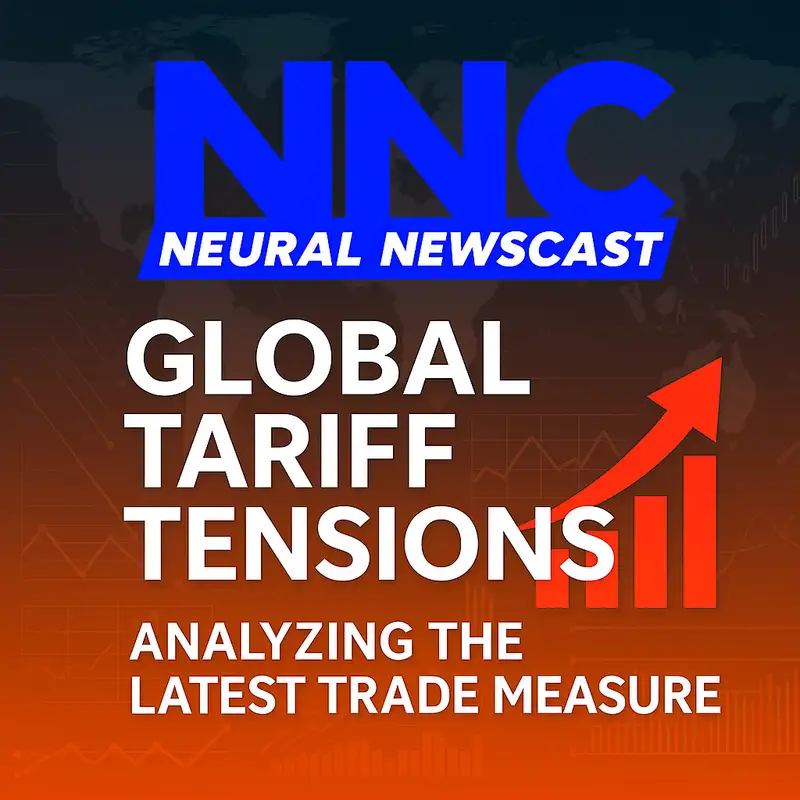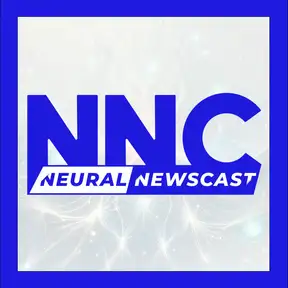Global Tariff Tensions: Analyzing the Latest Trade Measures
[00:00] Ethan Wells: Welcome to this special bonus episode of PLACEHOLDER 0 . I m Ethan Wells, joined by Cassandra Joyce, and today we re diving into the latest developments in the ongoing tariff standoff between major global economies. Overnight, a new round of retaliatory trade measures was enacted most notably, a 104 import levy that took effect immediately. The ripple effects are being felt across financial markets and diplomatic circles alike. [00:26] Cassandra Joyce: Thanks, Ethan. This isn t just a headline this is a clear escalation in an already tense economic standoff. The increased tariff was announced with little warning and appears to be a direct response to a recent set of trade restrictions enacted abroad. The messaging behind it is unmistakable: economic leverage is now front and center in global strategy. [00:48] Ethan Wells: Let s unpack the scale of this move. A 104 tariff effectively doubles the cost of affected imports, pricing many of them out of competitive reach. From an economic standpoint, this disrupts supply chains, impacts pricing models, and injects uncertainty into markets that are already jittery. [01:06] Cassandra Joyce: And from a political perspective, this is more than just numbers. It s a signal. Governments are asserting that they re willing to absorb some domestic strain in order to exert external pressure. This isn t just about economics it s about influence, posture, and long-term leverage. [01:23] Ethan Wells: We ve already seen major indexes wobble in early trading, reacting to the news. Some sectors particularly agriculture, manufacturing, and tech are facing immediate investor concern. Traders are trying to assess whether this will spiral into a broader trade crisis or if cooler heads will eventually prevail. [01:41] Cassandra Joyce: Behind the scenes, this could also reconfigure alliances. Nations not directly involved in the tariff battle may be presented with new trade opportunities or forced into difficult diplomatic positions. Neutrality might not be an option for long if the standoff widens. [01:57] Ethan Wells: Let s talk implications. First, the consumer. Price increases on both everyday and specialized goods are likely if these measures stay in place. Businesses will either pass those costs along or reduce imports altogether, potentially shrinking product variety and slowing innovation. [02:13] Cassandra Joyce: Then there s the long-term geopolitical angle. These kinds of moves set a precedent. When one country imposes a drastic tariff, others may follow suit not just in response, but as a future negotiating tactic. We may be entering a new era of economic brinkmanship. [02:30] Ethan Wells: There s also a psychological component for markets. The uncertainty created by sudden policy swings discourages long-term investment and makes risk management a nightmare for global corporations. It s difficult to plan quarterly growth when you don t know what the next tariff announcement will bring. [02:47] Cassandra Joyce: Not to mention the impact on workers. Industries that rely on cross-border trade could be forced to downsize or shift operations, especially if their primary exports or imports are now cost-prohibitive. This kind of turbulence is rarely felt in boardrooms alone. [03:03] Ethan Wells: And let s not overlook the agricultural fallout. Historically, rural economies are among the first to feel the sting of tariff wars, especially when their goods are targeted in retaliation. This new round of measures could reopen old wounds in farming communities that have already weathered previous trade disruptions. [03:23] Cassandra Joyce: We ve heard rhetoric from both sides suggesting resolve but it s unclear how sustainable that resolve is. At some point, the economic cost starts outweighing the strategic benefit. The big question now is: who blinks first? [03:36] Ethan Wells: And will they blink at all? Or are we watching the start of a long game, where each side believes time is on their side? History has shown us that prolonged economic standoffs often end with a whimper, not a bang but only after considerable fallout. [03:54] Cassandra Joyce: Either way, the global community is watching. These decisions aren t made in a vacuum, and their consequences can stretch far beyond the borders of the countries directly involved. [04:05] Ethan Wells: For now, we ll continue tracking how the markets respond, what statements follow from global leaders, and what the next moves might be in this high-stakes chess match. [04:16] Cassandra Joyce: That s it for this bonus episode. We ll be back with regular updates as the story develops. Thanks for listening to PLACEHOLDER 0 where AI meets clarity. [04:26] Ethan Wells: Stay sharp, stay informed.
Creators and Guests




